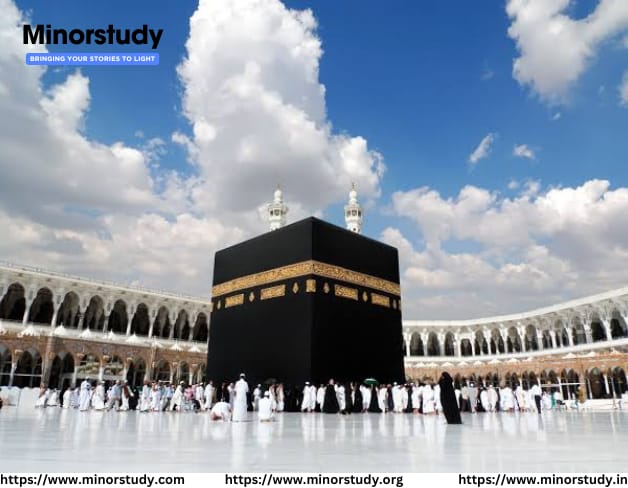🕌 All About Islam: The Path of Peace, Faith, and Submission to One God
Islam is one of the world’s largest and most influential religions, with over 1.9 billion followers worldwide. Derived from the Arabic word “Salaam”, meaning peace, Islam literally means “submission to the will of Allah (God)”. It’s not just a religion but a complete way of life encompassing faith, compassion, community, and responsibility.
- 🕌 All About Islam: The Path of Peace, Faith, and Submission to One God
- 📜 History of Islam: From Revelation to Global Faith
- 📊 Fascinating Facts About Islam
- 🌍 Significance of Islam
- 📜 The Five Pillars of Islam
- ❓ Frequently Asked Questions (FAQs)
- Q1: Who is the founder of Islam?
- Q2: What is the holy book of Islam?
- Q3: What do Muslims believe?
- Q4: Why do Muslims fast during Ramadan?
- Q5: Is Islam compatible with science?
- Q6: Do Muslims worship Muhammad?
- 🕯️ Observance: Islamic Festivals & Practices
- 💐 Wishing in Islamic Tradition
- 🧭 Importance of Islam in Daily Life
- ❤️ Daily Life Impact of Islam
- 📌 Important Points Summary
- 🌟 Conclusion: Islam – A Powerful Path to Peace and Purpose
From its spiritual roots in the 7th century Arabian Peninsula to its profound influence on art, science, culture, and governance, Islam continues to shape global history and human experience.
📜 History of Islam: From Revelation to Global Faith
🌟 Origins
Islam began in 610 CE when the Prophet Muhammad (peace be upon him) received his first revelation from Allah (God) through the Angel Jibril (Gabriel) in the Cave of Hira, near Mecca, Saudi Arabia.
🕌 Key Historical Events:
| Year | Milestone |
|---|---|
| 610 CE | First revelation received by Prophet Muhammad ﷺ |
| 622 CE | Migration (Hijrah) to Medina – Islamic calendar begins |
| 632 CE | Death of Prophet Muhammad ﷺ – leadership transitions to Caliphs |
| 661 CE | Start of Sunni-Shia split after Caliph Ali’s martyrdom |
| 750–1258 CE | Islamic Golden Age – science, medicine, philosophy flourish |
| 1492 CE | Muslim rule ends in Spain (Al-Andalus) |
| 20th century | Rise of modern Muslim-majority nations |
| Present | Islam is second largest religion worldwide |
📊 Fascinating Facts About Islam
📖 Islam’s holy book, the Qur’an, has remained unchanged for over 1400 years.
☪️ Muslims pray five times a day, facing the holy city of Mecca.
🌙 Ramadan is the ninth month of the Islamic calendar, a time for fasting and spiritual growth.
🕋 The Kaaba in Mecca is considered the House of God, and every Muslim is expected to perform Hajj at least once if financially and physically able.
🤝 Islam emphasizes charity (Zakat) – 2.5% of one’s wealth given to the poor annually.
🛡️ Islam prohibits alcohol, gambling, and usury (riba) to promote social justice.
🕯️ Women in Islam had rights to inheritance, divorce, and education long before many Western societies.
🕊️ “As-Salaamu Alaikum” (peace be upon you) is the universal greeting in Islam.
🎓 The first university in the world was founded by a Muslim woman, Fatima al-Fihri, in Morocco (859 CE).
🕌 There are over 3 million mosques worldwide, serving as centers of worship and community.
🌍 Significance of Islam
🧠 Spiritual Significance
Islam connects individuals to Tawheed – the belief in the Oneness of God, promoting monotheism, accountability, and moral living.
🤝 Social Significance
Islam encourages social harmony, justice, and compassion. It promotes the welfare of the poor, orphans, and elderly.
🕊️ Ethical Significance
No lying, cheating, backbiting
Prohibition of injustice, racism, and oppression
Emphasis on truth, humility, and charity
📜 The Five Pillars of Islam
These five acts form the foundation of Muslim life:
Shahada – Faith in one God and Muhammad as His messenger
Salah – Daily prayers (five times a day)
Zakat – Giving charity to the needy
Sawm – Fasting during Ramadan
Hajj – Pilgrimage to Mecca once in a lifetime (if possible)
These pillars instill discipline, community, and a deep connection to God.
❓ Frequently Asked Questions (FAQs)
Q1: Who is the founder of Islam?
Islam was revealed to Prophet Muhammad ﷺ, who is considered the last messenger in a long line of prophets (including Abraham, Moses, and Jesus).
Q2: What is the holy book of Islam?
The Qur’an, believed to be the literal word of God, revealed in Arabic over 23 years.
Q3: What do Muslims believe?
Muslims believe in one God, angels, divine books, prophets, the Day of Judgment, and divine destiny.
Q4: Why do Muslims fast during Ramadan?
To learn self-control, compassion for the less fortunate, and strengthen spiritual connection.
Q5: Is Islam compatible with science?
Yes. Many scientific discoveries were made by Muslim scholars during the Golden Age (e.g., algebra, optics, medicine).
Q6: Do Muslims worship Muhammad?
No. Muslims worship only Allah. Prophet Muhammad ﷺ is a beloved messenger, not divine.
🕯️ Observance: Islamic Festivals & Practices
🌙 Ramadan & Eid al-Fitr
A sacred month of fasting, prayer, and charity. Ends with Eid – a day of feasting, prayer, and joy.
🕋 Hajj & Eid al-Adha
Millions of Muslims travel to Mecca for pilgrimage. Eid al-Adha celebrates Prophet Ibrahim’s faith and willingness to sacrifice.
📖 Daily Life Practices
Prayers at dawn, noon, afternoon, sunset, and night.
Reading Qur’an regularly.
Halal dietary practices.
Modesty in dress and behavior.
💐 Wishing in Islamic Tradition
“Assalamu Alaikum” – Peace be upon you
“JazakAllah Khair” – May Allah reward you
“Eid Mubarak” – Blessed Eid
“Ramadan Kareem” – Generous Ramadan
“InshaAllah” – If Allah wills
“Alhamdulillah” – Praise be to Allah
Wishing others with good intentions and prayers is deeply embedded in Muslim culture.
🧭 Importance of Islam in Daily Life
Islam is not confined to rituals; it’s a complete lifestyle:
Teaches respect, gratitude, and discipline
Encourages cleanliness, honesty, and kindness
Offers solutions to personal, social, and ethical challenges
From waking up with the name of God to sleeping with prayers of protection, Islamic life is centered around mindfulness and purposeful living.
❤️ Daily Life Impact of Islam
| Area | Impact |
|---|---|
| Mental Health | Prayer and dhikr reduce stress and anxiety |
| Family Life | Encourages respect, love, and duty |
| Diet | Clean eating with ethical sourcing (halal) |
| Economy | Promotes fair trade, no interest-based lending |
| Environment | Encourages stewardship of Earth (Khilafah) |
| Justice | Strong focus on equality and rights |
| Charity | Empowers communities and reduces poverty |
📌 Important Points Summary
| Point | Insight |
|---|---|
| Name Meaning | Islam = Submission and Peace |
| Founder | Prophet Muhammad ﷺ |
| Holy Book | Qur’an |
| Core Beliefs | Oneness of God, Prophets, Judgment Day |
| Pillars | Shahada, Salah, Zakat, Sawm, Hajj |
| Key Values | Justice, Compassion, Modesty |
| Daily Impact | Ethical living, spiritual balance |
| Global Presence | 1.9+ billion Muslims across continents |
🌟 Conclusion: Islam – A Powerful Path to Peace and Purpose
Despite many misconceptions and challenges, Islam continues to inspire, guide, and uplift billions across the globe. It is a religion of peace, purpose, and profound inner strength.
At its core, Islam teaches that we are all creations of one God, equal in worth and responsibility. Its universal message of compassion, community, and clarity is more relevant than ever in today’s fragmented world.
Whether you’re a believer, a curious observer, or a seeker of wisdom—Islam offers timeless principles to live a more balanced, ethical, and spiritually fulfilling life.
So next time you hear the call to prayer, or see a Muslim offering a simple smile with “As-Salaamu Alaikum”—remember, it’s a greeting from a faith rooted in peace and divine purpose.








